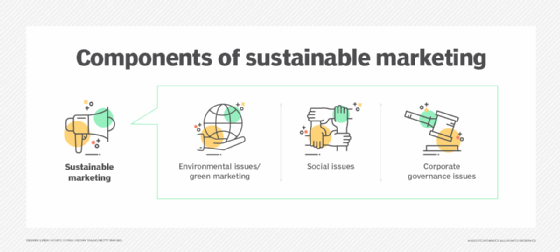What is sustainable marketing?
Sustainable marketing is a purpose-driven strategy that promotes products, services and brand values aligned with long-term environmental, social and economic well-being. It goes beyond simply advertising eco-friendly products or relying on traditional marketing, which is mainly focused on short-term profits. Instead, sustainable marketing embeds sustainability into the core of a company's marketing strategy and operations.
Consumers often encounter sustainable marketing when they choose to spend more on items that are locally sourced, ethically produced or fully recyclable. This reflects the growing influence of sustainability in purchasing decisions, especially among younger generations, who actively seek out brands that align with their environmental values.

What are the benefits of sustainable marketing?
Sustainable marketing offers a wide range of benefits that go far beyond a company's public image. It's a strategic approach that can drive long-term growth and resilience. The following are some of the key benefits of sustainable marketing:
- Brand trust and reputation. Sustainable marketing helps build a brand that consumers trust. When companies authentically commit to environmental and social responsibility, they stand out in a crowded marketplace. This credibility fosters deeper connections with customers and enhances a brand's reputation.
- Increased customer loyalty and sales. Many consumers, especially the younger generations, are increasingly drawn to brands that reflect their values. Sustainable marketing taps into this demand, encouraging loyalty and even premium purchases. Campaigns, that highlight eco-consciousness, such as Patagonia's, have been shown to boost both engagement and revenue.
- Talent attraction and retention. Purpose-driven brands don't just attract customers, they attract top talent as well. Employees want to work for organizations that align with their values. Sustainable marketing effectively communicates this purpose, helping companies recruit and retain passionate and committed team members.
- Investor appeal and long-term value. Investors increasingly see sustainability as a marker of long-term success. Brands that demonstrate environmental and social responsibility are seen as lower-risk and more resilient. By transparently communicating sustainability efforts, companies can strengthen stakeholder trust, attract purpose-driven capital and enhance their valuation over time.
- Competitive advantage. Sustainability is becoming a standard requirement in many government and corporate contracts. Companies that integrate sustainable practices into their marketing and operations gain a competitive edge, positioning themselves as responsible and forward-thinking suppliers. Environmental, social and governance (ESG) factors are also gaining prominence among investors, who increasingly view sustainable companies as lower-risk and better equipped for long-term financial success.
- Innovation and circular thinking. Sustainable marketing encourages companies to rethink traditional models by embracing innovation and circular economy principles. This involves designing products and services that minimize waste, extend lifecycle value and promote reuse or recycling. Brands that prioritize sustainable innovation not only reduce their environmental footprint but also position themselves as forward-thinking leaders in their industry.
- Alignment with consumer expectations. Modern consumers expect transparency and authenticity. Sustainable marketing meets these expectations by showcasing real efforts and measurable impact. It also helps brands avoid the pitfalls of greenwashing, reinforcing trust and long-term customer relationships.
5 principles to guide a sustainable marketing strategy
The following are five principles that can guide a company's sustainable marketing strategy:
- Customer-focused marketing. A sustainable marketing strategy begins with a deep understanding of the target audience's values, aspirations and concerns. Brands should align their messaging with what matters most to their customers, whether it's climate action, ethical sourcing or social equity. By prioritizing empathy-driven communication, companies can build trust, relevance and long-term loyalty.
- Purpose-driven branding. Organizations should strive for more than just profit and clearly communicate their brand's mission to their audience. Purpose-driven marketing connects a business to a larger cause, fostering engagement and loyalty. When customers recognize a brand's commitment to meaningful change, they're likely to support and advocate for it.
- Transparency and accountability. Sustainable brands build trust by openly sharing their practices, goals and progress. This typically includes disclosing their sourcing methods, environmental impact and ethical labor standards. By acknowledging their achievements and areas for improvement, companies demonstrate integrity and invite stakeholders into a genuine dialogue, strengthening their credibility and fostering long-term relationships.
- Societal marketing. Sustainable brands address broader societal challenges through their marketing efforts. This includes promoting awareness, education and action around issues such as climate change, inequality and resource conservation. By positioning the brand as a catalyst for change, not merely a seller of goods, companies contribute to meaningful progress and inspire collective responsibility.
- Authenticity and transparency. Sustainable brands avoid practices such as greenwashing and greenhushing by being honest about their sustainability efforts as well as their setbacks. Transparency builds credibility, and authenticity fosters meaningful relationships with stakeholders. By celebrating progress, acknowledging challenges and consistently communicating with integrity, companies reinforce trust and long-term engagement.
Real-life examples of sustainable marketing campaigns
The following examples of sustainable marketing campaigns illustrate how brands have effectively aligned purpose, awareness and action to drive meaningful impact.
Patagonia's Don't Buy This Jacket
On Black Friday in 2011, Patagonia ran a bold full-page ad in The New York Times featuring one of its jackets under the headline: "Don't Buy This Jacket." The message challenged traditional consumerism by highlighting the environmental cost of producing the garment and urging customers to repair, reuse and recycle rather than buy new.
While the campaign resulted in a 30% increase in sales, its primary aim was to challenge consumer habits and encourage more sustainable choices. The message aligned with Patagonia's long-standing environmental values and resonated with its audience, reinforcing trust and credibility without relying on traditional promotional strategies.
IKEA's Buy Back and Resell
As part of its goal to become a circular and climate-positive business by 2030, IKEA launched the Buy Back and Resell program. The initiative enables customers to return gently used IKEA furniture in exchange for store credit. These items are then resold in a dedicated As-Is section at reduced prices, helping to keep furniture out of landfills and in use longer.
The program addresses a significant issue of disposal and overconsumption in the furniture industry. By offering a practical way for customers to participate in reuse, IKEA integrates sustainability into its retail operations and encourages more responsible consumption habits.
Lush Cosmetics' Naked Packaging
Lush is famous for its naked products, such as shampoo bars, bath bombs and soaps that are sold without any plastic packaging. Their marketing highlights the brand's commitment to reducing plastic waste and its use of natural and ethically sourced ingredients.
Lush's sustainable marketing is built into their product and retail experience. By offering a unique shopping experience and a clear, visual commitment to sustainability, the chain attracts a customer base that values eco-conscious choices. Both in-store and online, Lush reinforces its values through content that promotes the benefits of natural ingredients and zero-waste living.
Lacost's Save Our Species
For a limited time, Lacoste replaced its iconic crocodile logo on polo shirts with ten different endangered species. The number of shirts produced for each species matched the number of animals remaining in the wild. Proceeds from the limited-edition collection were donated to the International Union for Conservation of Nature to support conservation efforts.
This campaign creatively used one of the brand's most recognizable assets -- its logo -- to raise awareness for a powerful cause. By replacing the crocodile emblem with endangered species, the campaign drew attention to biodiversity loss and encouraged public engagement with conservation issues. The limited production run reflected the urgency of the cause and helped connect consumer behavior with environmental awareness.
Levi's Buy Better, Wear Longer
Launched in 2021, Levi's Buy Better, Wear Longer campaign promotes urged consumers to make more intentional choices, such as investing in durable clothing, buying secondhand and using Levi's in-store Tailor Shops to extend the life of their garments. The campaign conveys a message of longevity, suggesting that Levi's denim is designed to last for generations, not just seasons.
The campaign aligns with Levi's broader sustainability efforts, including reducing water use and improving supply chain practices. The company backs its message with action by investing in materials such as cottonized hemp and organic cotton, and scaling its Water<Less® manufacturing process to reduce water use.
The thin line between greenwashing and sustainable marketing
The line between greenwashing and sustainable marketing is thin, but the distinction is critical for building a trustworthy brand and a genuinely responsible business. At its core, the difference between the two lies in substance versus claim.
Greenwashing
Greenwashing is the deceptive practice of making a brand appear more environmentally or socially responsible than it is. It's marketing that prioritizes a green image over a genuine commitment to sustainability. Companies that greenwash often do so to capitalize on the growing consumer demand for eco-friendly products without making real changes to their operations.
The following are the key characteristics of greenwashing:
- Vague and unsubstantiated claims. Greenwashing often uses ambiguous terms, such as eco-friendly, natural and green without providing evidence or data to back them up. For example, a company might use green packaging and imagery of nature without actually having a sustainable supply chain.
- Irrelevant or misleading information. Greenwashing typically highlights a small, single eco-friendly aspect of a product while ignoring a much larger, negative environmental impact. For instance, a car manufacturer might promote the fuel efficiency of a single model while its overall production process is highly polluting.
- Hidden trade-offs. Greenwashing often highlights one environmentally friendly aspect of a product while downplaying or ignoring other unsustainable practices. For example, a company might advertise its use of recycled materials but still produce its goods using nonrenewable energy and a wasteful manufacturing process.
- Fake certifications or logos. Some companies use fake logos or misleading symbols to suggest third-party endorsement or compliance with environmental standards. This tactic exploits consumer trust in regulatory oversight and can make it difficult to distinguish between genuinely certified products and those using deceptive visuals.
- Exaggerated or false claims. Greenwashing can involve outright lying about a product's environmental benefits, such as claiming a product is 100% recyclable when a large portion of it isn't or asserting carbon neutrality without credible offsets or emissions data. Such misleading statements distort consumer perception and erode trust in sustainability efforts, making it harder for customers to make informed and responsible choices.
Sustainable marketing
Sustainable marketing is an authentic and transparent practice where a company's marketing efforts are a true reflection of its genuine commitment to sustainability. It's not about making a brand look good, but it's about communicating real and verifiable progress.
The following are the key characteristics of sustainable marketing:
- Radical transparency. Being open about both successes and failures, a truly sustainable brand shares its sustainability reports, discloses its carbon footprint and is honest about the challenges it faces.
- Substantiated and specific claims. Sustainable marketing backs up all claims with clear and measurable data. Instead of saying eco-friendly, a brand might say made with 100% recycled cotton and provide details on its certifications, such as the Global Organic Textile Standard or Fair Trade.
- Holistic approach. Sustainable marketing integrates sustainability into every aspect of the business, from the supply chain and product design to employee well-being and community engagement.
- Third-party validation. Companies practicing sustainable marketing seek and display certifications from reputable third-party organizations such as B Corp, Fair Trade and the Forest Stewardship Council (FSC). These certifications serve as independent proof of a company's commitment.
- Education and empowerment. Companies that adopt sustainable marketing, educate consumers and empower them to make better choices, rather than just using green language to drive sales. This could involve campaigns that promote repairing products, recycling or reducing consumption.
Sometimes, even companies with genuine intent can unintentionally greenwash when they fail to meet their stated sustainability goals, rely on vague or imprecise messaging, or use eco-themed visuals without substantive action behind them.
One way to distinguish greenwashing from authentic sustainable marketing is to consider whether a company invests more in promoting its sustainability efforts than in implementing them. If promotional efforts outweigh tangible progress, the messaging may be misleading. In contrast, when a brand's actions are measurable and its communications transparently reflect real outcomes, it indicates a more credible and committed approach to sustainability.
How to avoid greenwashing in sustainable marketing
Product sustainability is increasingly important to consumers, making it essential for brands to avoid greenwashing. According to TheRoundup.org, 78% of consumers consider sustainability a key factor in their purchasing decisions.
The following are some examples of sustainable marketing and how companies can avoid greenwashing to build genuine credibility:
- Be specific and measurable. Organizations should avoid vague terms such as eco-friendly and green. Instead, they should use concrete, quantifiable claims, such as "We reduced carbon emissions by 20% last year by switching to renewable energy." Clear, data-driven statements enhance credibility and build trust with stakeholders.
- Use third-party certifications and independent audits. Organizations should obtain credible certifications such as B Corp, FSC and Fair Trade, and prioritize verifiable, externally audited claims. Highlighting these certifications helps build trust and demonstrate accountability to stakeholders.
- Ensure consistency across operations. Sustainability should be embedded across the organization and not limited to a single product line or campaign. Highlighting one green initiative while overlooking broader environmental impacts is a common indicator of greenwashing.
- Partner with charities. Partnering with charities can help organizations avoid greenwashing if the collaboration is authentic, aligned with their sustainability values and transparently communicated. When the brand's actions reflect the values of the charity, the partnership becomes a credible signal of true commitment and not just a marketing tactic.
- Provide purpose-driven sustainability. To avoid greenwashing, companies must communicate the purpose behind their sustainability initiatives. Simply listing actions isn't enough, as most stakeholders want to understand a company's deeper motivation. This means connecting sustainability efforts to broader goals, such as climate action, social equity or long-term business resilience. When organizations transparently articulate their motivations, they build trust and stronger emotional connections with their audience.
- Make sustainability efforts measurable. To ensure credibility, organizations must set measurable sustainability goals, such as reducing emissions or increasing renewable energy use, and track progress through clear key performance indicators. These metrics provide a roadmap for action, enable accountability and move sustainability beyond aspirational statements.
- Be honest about limitations. Transparency includes acknowledging areas for improvement. Consumers appreciate honesty and are more likely to trust brands that share their progress and challenges.
- Align with ESG standards. Organizations should integrate the ESG principles into their sustainable marketing strategy. This ensures that their sustainability efforts are not just marketing-driven but embedded in corporate responsibility.
- Educate your team and collaborate with experts. To avoid greenwashing, organizations should train internal teams on accurate sustainability communication. They should also engage environmental consultants or academic experts to validate claims and ensure their messaging is aligned with evolving standards and regulations.
Greenwashing can damage customer trust and a brand's reputation. Discover how marketers can avoid greenwashing and provide clear evidence to support their claims.






